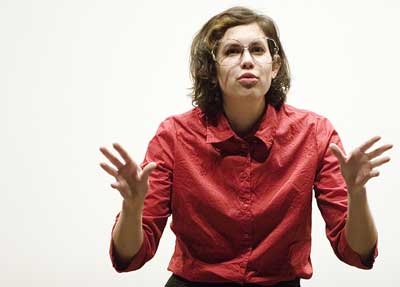On the stage of Stewart Theatre, my character in Eve Ensler’s The Vagina Monologues declares, “I love vaginas!” And while it’s easy for a lesbian dominatrix to take so strong a stance for female empowerment, my own journey -Ñ and that of thousands, perhaps millions, of women worldwide -Ñ towards power in my feminine identity has taken a more stumbling, underground route.
Sorting out the intricacies of feminism, especially if like me you’re not a feminist, can be a challenge. Can you demand equal treatment for your gender while still expecting men to open doors? Can you appreciate maternal instincts and the demands of a “domestic engineering” career while still fighting stereotypic depictions of women as baby-machines?
Common misconceptions categorize The Vagina Monologues as a play celebrating the femme-Nazi agenda. Behind the shock-appeal exterior, however, lies a humorous, immensely moving vision of the struggles, victories and desires that all women experience.
The Monologues opens with quotes collected by Ensler from interviews with hundreds of women who answered the questions, “If your vagina could speak, what would it say?” and, “What would your vagina wear?” Reponses range from “Love me,” “More please” and “Slow down.” From diamonds to a raincoat to something machine-washable.
These free-spirited, insightful answers inspire the audience to think beyond the physiological notion of the vagina. Ideally, the vagina represents to a woman her livelihood, her satisfaction and her wellbeing. It is the seat of her yearnings, both sexual and ideological. It is something precious, an extension of her.
On the afternoon that the cast first met together, director Celeste Richie and producer Shannon Johnson asked every member of the cast those two questions. Few of the women had thought about their vaginas in such a context before, but the entire cast delighted in describing just which pair of stilettos their vagina would don if it could — Jimmy Choo turquoise leather sling-backs, if you want to know.
Every monologue in the show offers some opportunity for women to laugh in agreement, recall personal situations in her own life or commiserate with the tragedy of sexual violence. The outrage of feminine products made by men, the quandary of hair or no hair, the Big O — all are topics touched upon by Ensler’s work.
Most women in my life have supported my participation in the N.C. State Women’s Center’s production with enthusiasm. But as my boyfriend, male friends and co-workers received the news, a chorus of questions arose: “What vagina are you?” “Is there nudity?” “Are the other girls hot?” I reduce this to one universal male concern — can you enjoy The Monologues without a vagina?
Anyone with a sense of humor, regardless of chromosomes, will enjoy The Vagina Monologues. Come see the monologue of a hilarious 72-year-old woman with a New York accent talk about her “down there.” Come see an Englishwoman describe her vagina as she discovers orgasms while looking through a hand mirror. Come learn exactly why women gravitate towards short skirts. Come see me illustrate over a dozen unique moans that my character discovered in her career as a sex worker.
Beyond that, however, men will benefit the most from their increased awareness about vaginas. From the perspective of hundreds of women, the play discusses in intimate detail the topics of greatest interest to the college male — foreplay, sex and everything in between. If you’re in awe of vaginas — and I challenge you to find a heterosexual man who isn’t — The Vagina Monologues will remind you why. Awareness is the key to appreciating and pleasing the vagina.
It’s not easy for any of us to stand on a stage and declare how much we love our vaginas. But every cast member in this benefit production knows how important it is for a woman to love herself and her sexuality. The cast of The Vagina Monologues is on a mission to morph NCSU’s timid girls into empowered, confident Vagina Warriors who know who they are and what they deserve.
As the first lines of the play detail, we should be worried about vaginas. We focus far too little positive attention on this small but infinitely important aspect of womanhood. The Monologues provides a type of forum — an unorthodox but desperately needed springboard — for exploring the choices and experiences that constitute womanhood. As The Vagina Monologues so artfully preaches, a woman must learn to love every aspect of her vagina, must recognize and appreciate the events, emotions and attractions that define her. That’s what feminism is really about.








